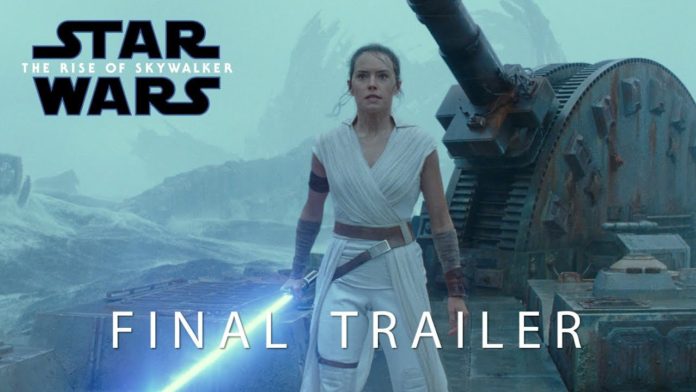Star Wars: the Rise of Skywalker, directed by J.J. Abrams, offers a Star Wars adventure like any other, though it struggles to deliver an articulate ending to the series as a whole.
Rise of Skywalker is the final film of Disney’s sequel trilogy, and the Star Wars universe has never looked better. The film is full of visually immersive scenes and locations, with the look and cinematography of the film being its strongest point.
The story opens with Kylo Ren travelling to meet with Emperor Palpatine, who is revealed to have survived the events of Return of the Jedi. As news of this spreads throughout the galaxy, the Rebel forces move to find his whereabouts and stop him before he forms a new Empire.
There are some great performances in Abrams’ film. Adam Driver delivers an emotionally driven portrayal of Kylo Ren, communicating the character’s identity issues with surprising realism. Ren has real depth as a character, and completing his arc is one instance where Rise of Skywalker succeeds. It’s easy to feel sympathy for Driver’s character despite his allegiance to the dark side, creating an interesting dynamic between him and his foil, Rey.
Daisy Ridley’s character Rey is also given more depth in this installment as she struggles to bring hope to the rebellion when faced with Ren and the Emperor. A significant revelation regarding her origins gives Ridley, like Driver, room to portray an internal struggle, making her performance significantly more interesting than in earlier films in the trilogy.
As a concluding chapter, Rise of Skywalker suffers from its predecessors’ creative differences. The first film in the trilogy The Force Awakens evoked the original films by following similar plot points, while 2017’s The Last Jedi stirred controversy among fans due to director Rian Johnson’s deviation from the traditional Star Wars formula.
Johnson’s and Abrams’ different takes on where the story should go is the most jarring thing about the trilogy as a whole. Plot points were created and dropped between the films at each director’s discretion. For example, the first film teased the mystery of Rey’s family lineage, which seemed to be resolved in the second installment as she was told that her parents were “nobody,” suggesting that anybody can be a Jedi. In Rise of Skywalker, however, she’s revealed to be related to an established character in the franchise, contradicting The Last Jedi’s core message.
It’s because of these contradictions that Rise of Skywalker struggles to bring the story to a satisfying conclusion. It’s clear that Disney and Lucasfilm had no set story arc for the trilogy to follow before beginning production on it, which feels like a gross mishandling of the franchise.
In this film, Abrams once again takes a cautious route, sticking to plot points that will feel familiar to fans of the series. Like Return of The Jedi, the original trilogy’s conclusion, the film presents the Emperor as the antagonist, has a Sith lord give up his evil ways and ends with the rebellion saving the galaxy. It’s all been seen before.
At the same time, it’s a Star Wars film. You’ll have fun watching it, and that’s all that really matters. There are lightsaber fights and space battles and everything else one expects from a film in the series. The original films aren’t exactly masterpieces, either, but the series’ cheesiness is part of its charm.
Even if superfans will nitpick it to death, Abrams’ film and the others in the trilogy were a genuine attempt to capture the nostalgia that comes from the Star Wars films, and I think they accomplished that. The trilogy has introduced a new generation of viewers to Star Wars and will surely be cherished just like the original and prequel trilogies in the series are today.












